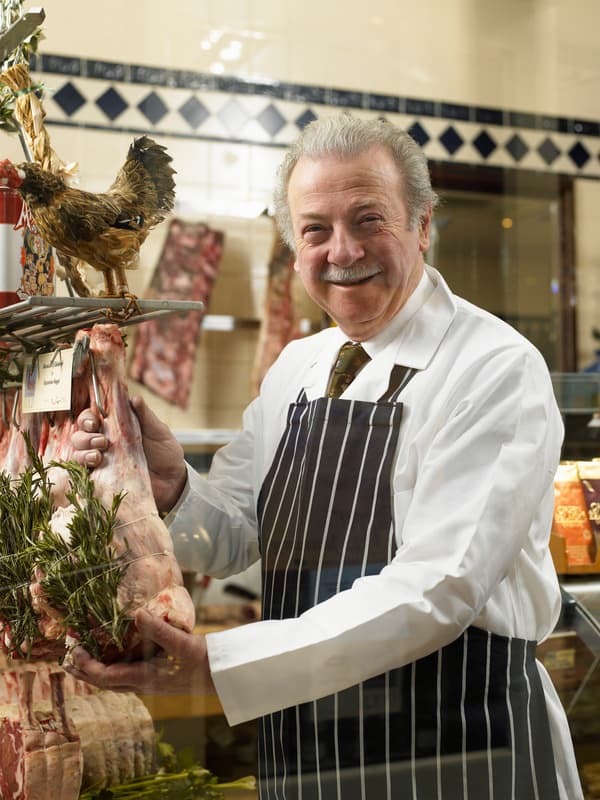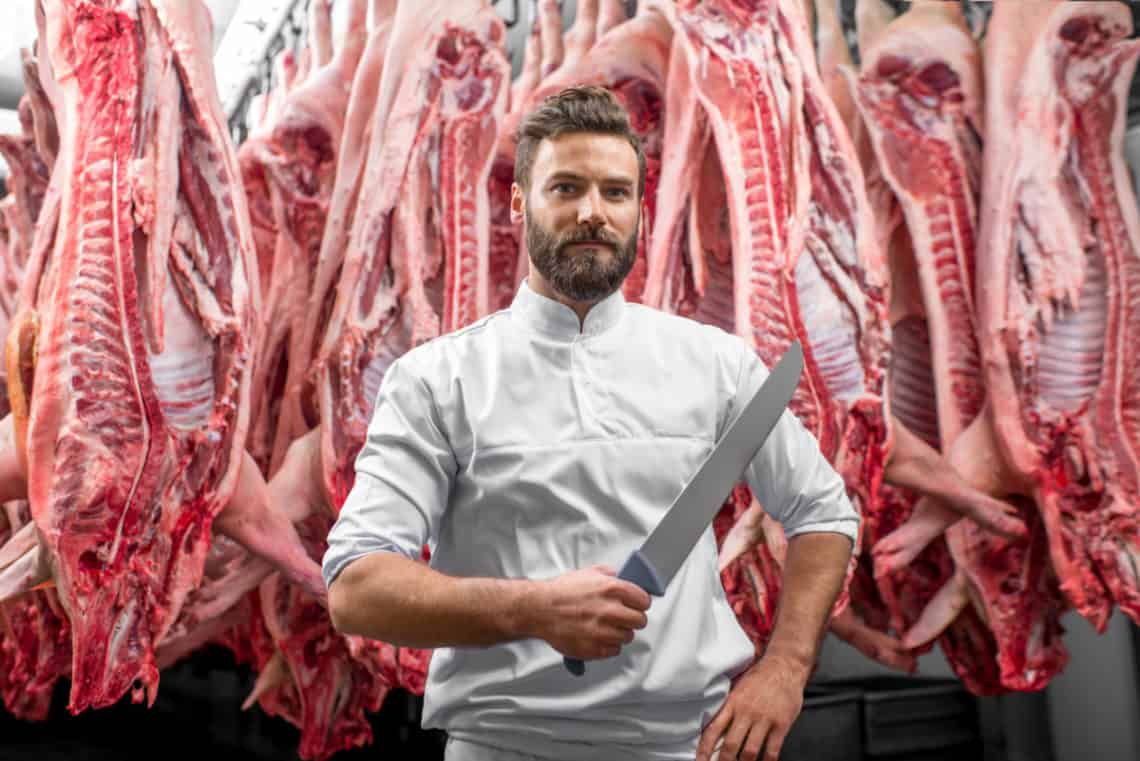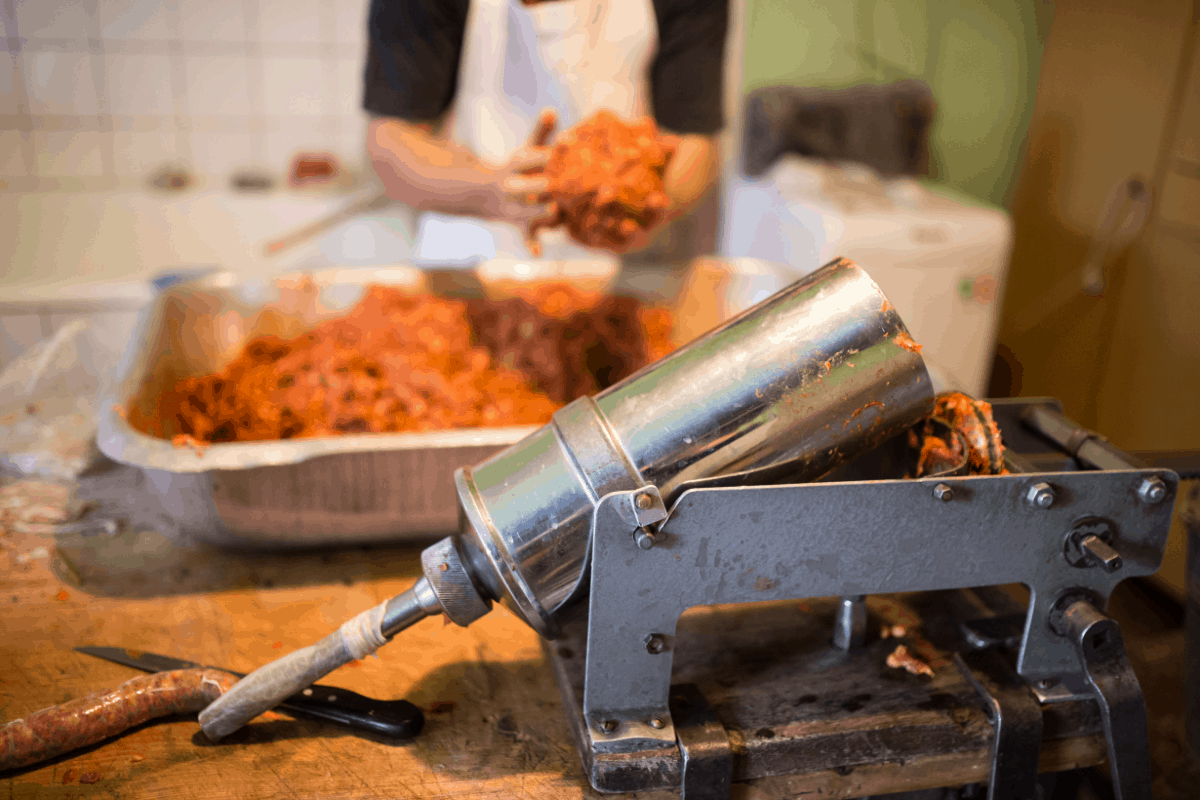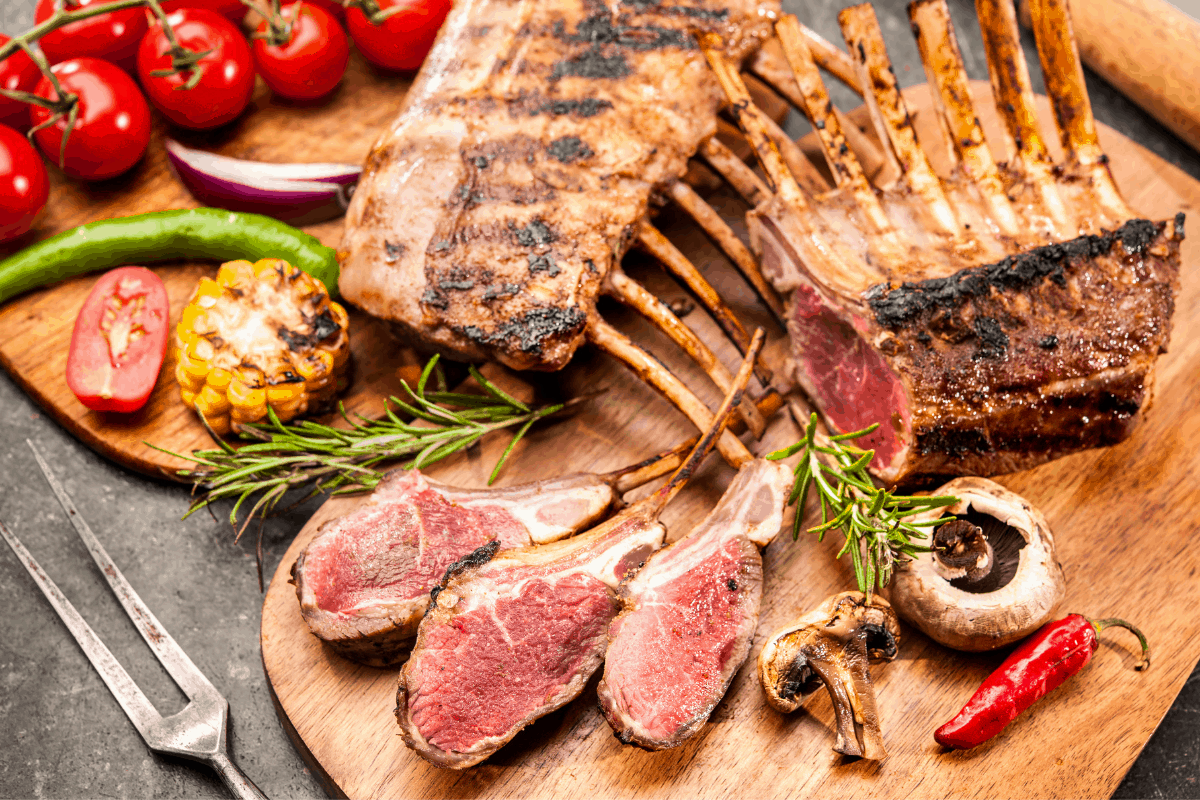Many people consider a butcher, meat cutter and slaughterman to be the same job, and whilst in some cases that may be true, usually each of these occupations perform a different role in their handling of the meat.
So what is the difference between a butcher, meat cutter and Slaughterman? A slaughterman deals with the killing, skinning and eviseration of an animal. The butcher will then break down the animal carcass into smaller sections known as primal cuts. A meat cutter will then cut those primals into retail cuts, such as roasts, chops & steaks, for display and sale.
We will now look at how each of these occupations differ, but ultimately serve the same purpose of getting your meat from the field to your plate.
Warning!
The following content includes information and images related to animal slaughter that some readers may prefer not to see!
Click Here To Leave & Return To Homepage
The Role of the Slaughterman
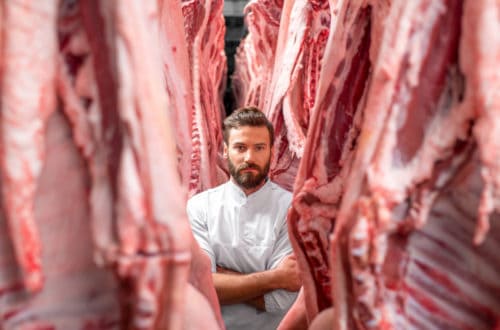
The role of the slaughterman is to humanely and safely kill an animal so that it can be processed for meat.
The duties of slaughterman will include:
- Penning & Securing Animals Prior To Slaughter
- Performing the Killing Technique in a Swift, Safe and Humane Manner
- Skinning of the Animal
- Eviseration of the Animal (Removing Internal Organs)
- Dividing Larger Carcasses into Halves or Quarters
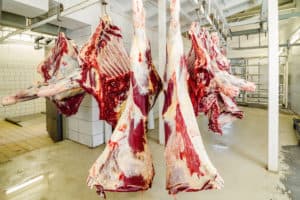
Working Conditions
The work can be unpleasant, stressful, and sometimes dangerous due to the working conditions.
Accidents happen, and some of the hazards that face a slaughterman each day are:
- Being kicked, bitten, squashed or trodden on by an animal.
- Slipping on the blood and guts that cover the floor of the workspace
- Getting cut by the knives or saws used to perform their job
- Illness from working all day in a hot and wet environment
- Depression or mental breakdown due to the nature of the trade and working conditions.
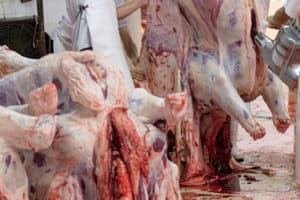
It is not unfair to say that working in a slaughterhouse takes a certain kind of personality and constitution.
Slaughtermen have to be able to detach themselves from the killing aspect and leave the work behind them when the work day is over.
Earning Potential
Although there is skill involed, the job is not classed a skilled labour and wages are usually on the lower end of the scale.
A slaughterman in the USA in 2018 was paid a median wage of approx $13.76 per hour / $28,600 per year. [Source: US Bureau of Labor Statistics]
The Role of the Butcher
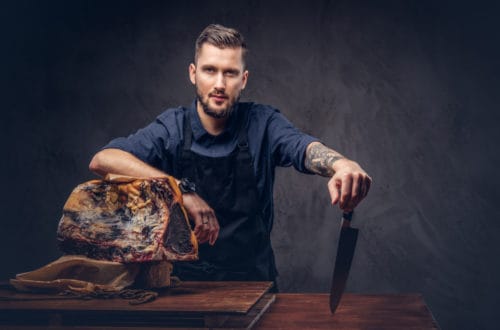
Describing the role of the butcher is a little more complicated as there are many levels of expertise to the job.
In its simplest form, the butcher takes the whole, or partial carcass meats, and breaks them down into smaller chunks of meat.
However, a well trained and experienced butcher can be proficient in many aspects of meat productions such as:
- Slaughtering
- Bone Removal
- Sausage & Burger Production
- Meat Curing & Smoking eg: Bacon, Salami, Hams etc
- Pie Making & Cooking
- Meat Cutting
- Retail Display and Sales
Many butchers that own their own business, are capable of doing everything required to get the animal from the field and on to your plate.
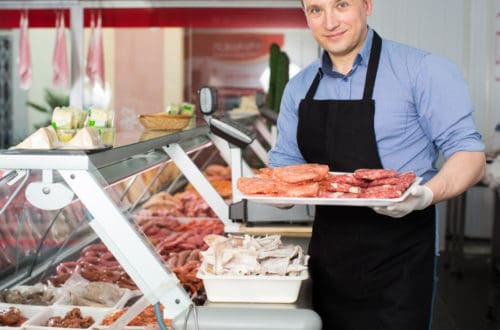
Some butchers are only trained in the breaking down of the carcass, and have no idea how to make sausages or pies.
Some butchers go to special college or universities to train to be butchers. Here they will learn about all the different muscle groups and names, and will be able to explain how every muscle works in relation to the animal. However, they may know every muscle, but they will not have gained the real world skills and experience that an on the job trained butcher will have.
Some butchers will have only worked in one place and so will only know one way of doing things, whereas others may have worked around the world and know many ways of doing the job.
When all is said and done, if you have the skill to take a whole animal carcass and break it down into smaller primal cuts that a meat cutter can use, then you can be called a butcher. How good of a butcher is a different matter!
Working Conditions
The skills of a butcher can be required in many areas of the food industry, such as:
- Independent Butcher Shops
- Meat Markets
- Meat Packing Plants
- Supermarkets & Grocery Stores
- Private Hire for On Site Butchery on Farms, Homesteads & Small Holdings
As you can imagine, with so many different positions available within the industry, the working conditions can differ dramatically.
A pack house worker may spend an 8 hour shift inside a chilled environment of no more than 37 ºF / 3 ºC.
A grocery store worker may just be in an air conditioned environment, and a travelling butcher could find themselves in a stuffy barn on a warm day, to a freezing shed on a winters day.
One constant within the industry is that they handle cold meat most of the day, and usually in a cold environment. The job can also be messy with some blood, guts and other undesrirable elements.
Butchers use equipment that can cause harm such as knives, saws, grinders and slicers and so may be required to wear a heavy chainmail apron and/or glove.
The job can be physical with lots of heavy lifting, bending and working the arms and shoulders whilst standing most of the day. Traditionally it involves early morning starts, and sometimes the days can be very long, especially at Thanksgiving and Christmas time.
Another aspect of the job that many people don’t realise, is how much cleaning is involved (unless they are in a posititon where cleaners come in at the end of the shift!).
Usually, the butchers are responsible for cleaning down all working areas and equipment at the end of each shift. This can involve dismantling and assembling machinary to clean, scrubbing cutting blocks, washing knives and mopping floors. There is also the cleaning of all the refrigerators, freezers and display cases if you work in a store.
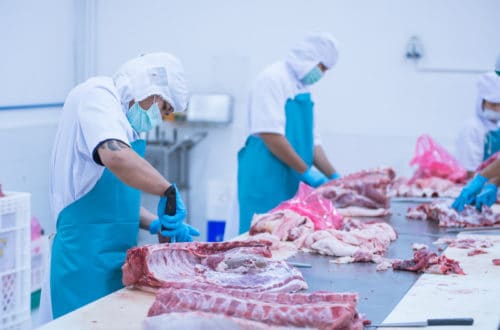
Earning Potential
A well trained butcher will not go short of work, however the rate of pay within the industry can differ dramatically.
Independent stores that require a variety of skills as mentioned earlier, is likely to pay more than a butcher working a meat counter in a supermarket.
A journeyman butcher who travells from farm to farm and butchering their animals on site, will likely charge a higher price than the butcher in the independent store.
The butcher working in a pack house on piece work, will have the ability to increase his wages dependent on his speed and skill.
The median pay for a butcher in the USA in 2018 was $15.18 per hour/ $31,500 per year. However many skilled butchers will be earning $20+ per hr in certain positions. [Source: US BLS]
The Role of the Meat Cutter
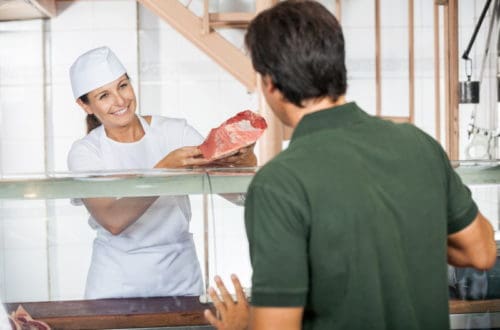
Well, as you can imagine, the clue is in the name.
A meat cutter is someone that is trained to cut the smaller boneless sub primal cuts into retail portions.
This usually means taking something like a boneless pork loin and cutting it into pork loin steaks or a boneless strip loin and cutting it into New York strip steaks.
The role of the meat cutter may vary slightly from job to job and could include:
- Cutting larger roasts into smaller roasts
- Rolling and tying roasts
- Cutting meat into steaks or diced.
- Portion cutting meat
- Grinding meat
- Packing, pricing and labelling meat for sale.
- Displaying meat in a meat counter
- Serving customers with over counter sales
Basically, a meat cutter does the smaller jobs that doesn’t require the skill of a butcher. The meat cutter position came about when supermarkets realised that they could pay someone less money to do this work. Rather than paying the skilled butcher to do the whole job, they trained meat cutters and drastically reduced their wage bill, and increased profits. This practice meant that rather than a store using 5 skilled butchers to work the meat department, they could employ 1 or 2 to do the actual butchering, and then have 3 meat cutters doing the minor cutting, packing and labelling. This probably saved them $8 – 12 per hour, almost the equivalent of another persons wage. This has almost become the norm within the industry now, with 1 butcher working alongside several meat cutters.
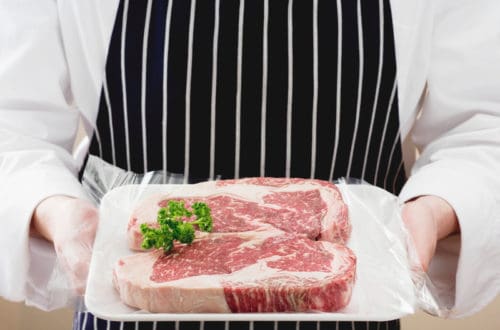
Working Conditions
Well as you can imagine, the working condition for a meat cutter will be very much the same as those of the butcher.
Meat cutters generally work alongside the butchers, cutting the meat that is passed to them by the butcher, into retail cuts.
Meat plants, pack houses, supermarkets and grocery stores all employ meat cutters to do the less skilled jobs and save money on wages.
Depending on the skill level of the meat cutter, they will almost certainly use the same equipments as a butcher such as knives, grinders and saws.
The physical side of the job should be easier as the size of meat being cut by a meat cutter is much smaller than that being done by the butcher.
Having said that, it is not uncommon for the meat cutter to be sent to the refrigerator to fetch whatever the butcher needs, so that the butcher can continue to work and not waste time doing less productive tasks.
Earning Potential
As mentioned earlier in the article, meat cutters do not earn as much as a fully trained butcher.
A meat cutter can expect to be paid $2 – 5 dollars per hour less than a butcher in the same place of work.
Again, just how much this wage varies will be dependent on the skill level of the butcher and the meat cutter.
The more skills the meat cutter gains, the more he will move towards becoming a butcher, and so the earning potential will increase.
With the right training, if a meat cutter wishes to progress to becoming a fully trained butcher, the opportunities will be there.
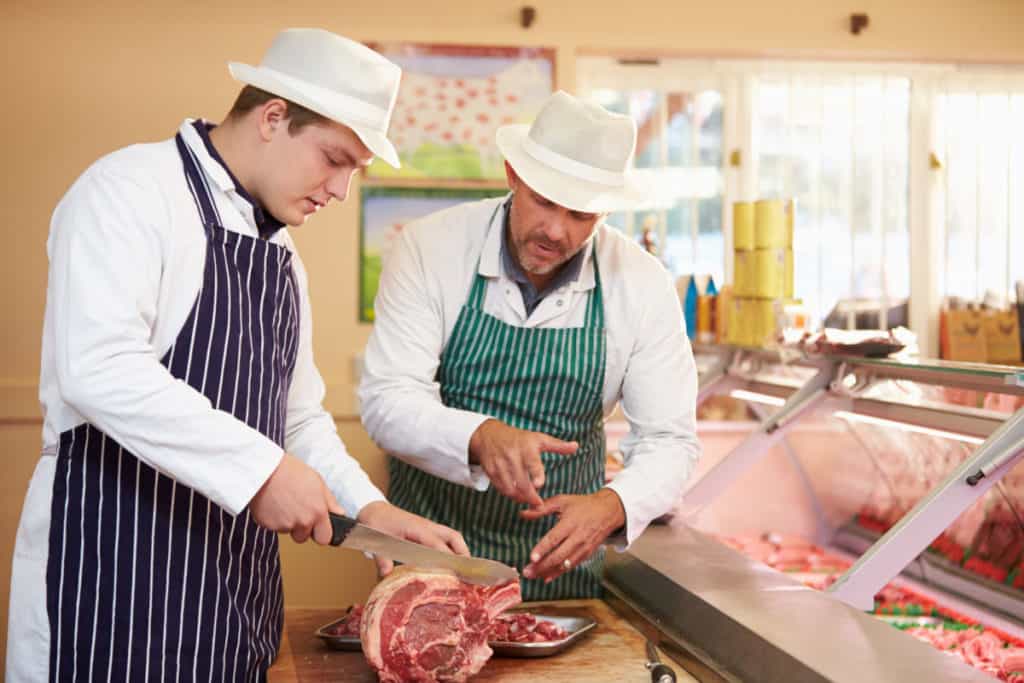
3 Jobs With One Function
So hopefully by now you will understand the 3 different types of jobs that the meat industry uses to get the meat from the field to the fork.
Each role is challenging and rewarding in their own right.
Most workers within the industry take pride in their work and want to do justice to the animal that made the ultimate sacrifice to feed us.
They will try to utilise every part of the animal so that nothing goes to waste.
They will treat the meat with respect, and try their best to ensure that you, the customer, are getting the best piece of meat that they can offer.
The butcher especially will always look for ways to reinvent what can be done with the meat, to ensure that your menu never gets boring.
The next time you visit the meat counter, ask the butcher to answer any questions you may have. They love to talk about their work, and to pass on the knowledge and tips that they have learnt on their journey.
They may even point you in the right direction of the best buy for that day too!
